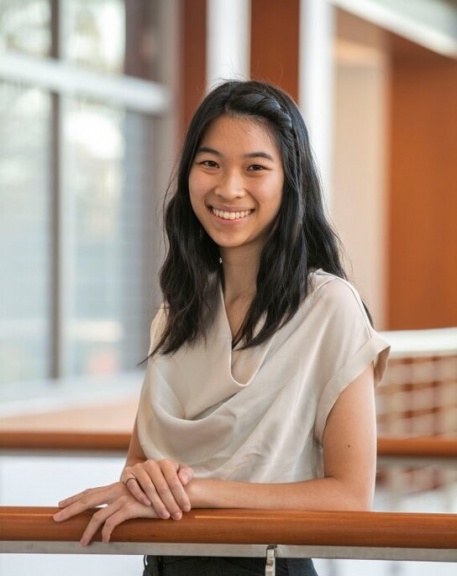Our Student Spotlight celebrates student members of the Meharry-Vanderbilt community, whose achievements reflect the MVA’s commitment to enhance and support high-impact translational research, interprofessional learning, and community engagement.
This past year, Kirsten Nguyen moved to Nashville from Southern California to begin medical school at Vanderbilt University. Upon arrival, she immediately noticed that Nashville has far fewer Asian Americans. California, on the other hand, has the largest Asian population in the United States. At the University of California, Berkeley, where Nguyen completed her undergraduate degree in developmental genetics, students identifying as Asian make up over 30% of enrollees.
“I may have taken it for granted,” she says. “In California, I never really felt like a minority. Here [in Nashville], when I go into clinic, I am often asked about my nationality.”
In her search for community, Nguyen felt her academic interests begin to branch out from education equity into racial disparities and language barriers. Nguyen is currently completing a literature review for Dr. Melinda Aldrich, associate professor in the Vanderbilt University School of Medicine, on racism and distrust in lung cancer screening.
Nguyen is also excited about her involvement with the Shade Tree Clinic, a comprehensive, free health clinic run by Vanderbilt University medical students. She explains, “In California, I worked in a fast food restaurant, and everyone spoke Spanish. I never challenged myself to speak Spanish. At Shade Tree, everyone is learning, so I feel more welcome to try.”
As a health care provider, Nguyen is interested in serving diverse groups, especially Asian Americans. Recently, she joined the Asian Pacific American Medical Student Association (APAMSA), a national organization of medical and pre-medical students committed to addressing the unique health challenges of Asian American, Native Hawaiian, & Pacific Islander (AANHPI) communities.
During an online retreat, Nguyen chatted with other APAMSA members about identifying research opportunities. As it happens, one of them completed medical school and his residency at Vanderbilt. He reached out to Nguyen to offer support. Of the interaction, she says, “It made me feel like I am part of something bigger. It is nice to have that community.”
As someone who values having several social and professional circles, Nguyen encourages other medical students to look for opportunities beyond the School of Medicine. It was during her search for service opportunities that Nguyen found the Meharry-Vanderbilt Student Alliance (MVSA), an inter-institutional, interprofessional group of graduate and medical students directed by the MVA.
On her “Nashville bucket list,” Nguyen wants to get more involved in the AAPI advocacy scene. “In California, there was always someone doing the advocacy work, and it felt like most people were on the same page,” she explains. “In Nashville, there may be fewer groups, but I feel like I can have a greater impact.”
Nguyen is preparing for her second year along with rotations. Though she is unsure of the specialty she will pursue, Nguyen is interested in adolescent medicine, women’s health, geriatrics, and palliative care.
You can find out about opportunities and engage with students like Nguyen by joining the MVSA. If you are a graduate or medical student at Meharry Medical College or Vanderbilt University, please sign up to join.
About the Meharry-Vanderbilt Alliance
The Meharry-Vanderbilt Alliance is a collaborative initiative between Meharry Medical College and Vanderbilt University Medical Center. Since 1999, faculty, researchers, health professionals, students, and community members have worked with the MVA to address health disparities. The MVA is committed to cultivating strategic partnerships, building community capacity, and facilitating research and learning opportunities. We seek to promote community resources and assets that strengthen connections between our institutions, partners, and the populations they serve.
